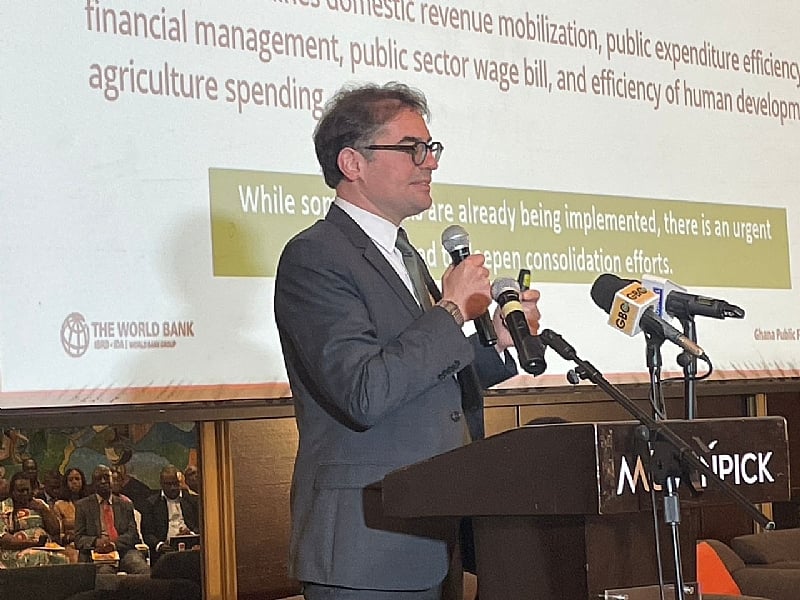Ghana’s Fiscal Landscape: A Need for Comprehensive Reform
Ghana, a nation with significant economic potential, has experienced impressive GDP growth in recent years, largely fueled by oil production and debt accumulation. However, this growth trajectory has masked underlying vulnerabilities, leaving the country susceptible to external shocks. The World Bank, in its recent Public Finance Review, underscores the urgent need for Ghana to implement comprehensive fiscal reforms to build a resilient and equitable fiscal system capable of supporting sustainable development. The report highlights how Ghana’s reliance on debt-financed growth, coupled with weak expenditure controls and inefficient public spending, has created a fragile fiscal environment prone to crises.
The World Bank’s analysis paints a clear picture of the challenges facing Ghana’s fiscal landscape. Between 2008 and 2019, the country’s fiscal deficit averaged 4% of GDP, double the average of the preceding years. This surge in the deficit was accompanied by a significant increase in public expenditure, which rose to 19% of GDP, highlighting inefficiencies in resource allocation and expenditure management. The report identifies weak expenditure controls, inefficient public spending, underperforming revenue collection, and high-cost borrowing as key factors contributing to Ghana’s recent debt crisis. This precarious financial situation underscores the need for immediate and sustained efforts to address the structural weaknesses within the fiscal system.
The World Bank emphasizes that while Ghana has made commendable efforts to stabilize its economy in the short term, these efforts must be complemented by long-term structural reforms to address the root causes of the crisis. These reforms should focus on strengthening fiscal institutions, improving public financial management and procurement systems, and implementing a robust fiscal rule to ensure debt sustainability. Furthermore, the report stresses the importance of enhancing transparency in fiscal operations through timely access to data and greater independence of the Fiscal Council, a body responsible for overseeing fiscal policy. These measures are essential not only for addressing the current challenges but also for building a more robust and resilient fiscal system capable of withstanding future shocks.
Key Policy Priorities for Fiscal Consolidation and Sustainable Growth
The World Bank’s Public Finance Review proposes four key policy priorities to guide Ghana’s path towards fiscal consolidation and sustainable development:
-
Fiscal Discipline and Oversight: This involves strengthening budget preparation and execution processes, implementing effective expenditure controls, and enhancing the capacity of fiscal institutions to monitor and manage public finances. A robust fiscal rule should be established to ensure debt sustainability and guide fiscal policy decisions.
-
Effective Revenue Mobilization: Improving tax administration, broadening the tax base, and tackling tax evasion are crucial for increasing domestic revenue collection. This will reduce reliance on borrowing and create fiscal space for critical investments in development priorities.
-
Financing Mix Management: Optimizing the mix of domestic and external borrowing, while minimizing borrowing costs, is essential for maintaining debt sustainability. This requires careful consideration of interest rates, exchange rate risks, and the maturity structure of debt.
- Prioritizing Investment in Human Development: Investing in education, health, and social protection programs is crucial for fostering inclusive growth and improving human capital. These investments contribute to long-term economic development and enhance the well-being of the population.
The World Bank emphasizes that these policy priorities are interconnected and must be pursued in a coordinated manner to achieve lasting fiscal stability and sustainable development. Furthermore, the reforms should be designed and implemented in a way that is equitable and protects vulnerable populations.
Ghana’s Commitment to Fiscal Reforms and Long-Term Growth
The Ghanaian government has expressed its commitment to implementing the necessary reforms to address the country’s fiscal challenges. Recognizing the urgency of the situation, the government has pledged to strengthen public financial management, improve expenditure efficiency, and boost domestic revenue mobilization. These efforts are seen not just as a response to the current crisis, but as a fundamental step towards building a more resilient and sustainable economy. The Public Finance Review serves as a valuable roadmap for guiding these reforms and ensuring that they are aligned with the country’s long-term development goals.
Ghana’s journey towards economic development has been marked by both remarkable achievements and significant challenges. The current fiscal situation presents a critical juncture for the country. By embracing comprehensive fiscal reforms, strengthening institutions, and prioritizing investments in human development, Ghana can lay the foundation for a more prosperous and equitable future. The World Bank’s recommendations provide a framework for action, and the government’s commitment to reform offers hope that Ghana can overcome its current challenges and unlock its full economic potential. The path towards sustainable development requires sustained effort, effective implementation, and a commitment to transparency and accountability. By embracing these principles, Ghana can build a stronger, more resilient, and inclusive economy for all its citizens.


